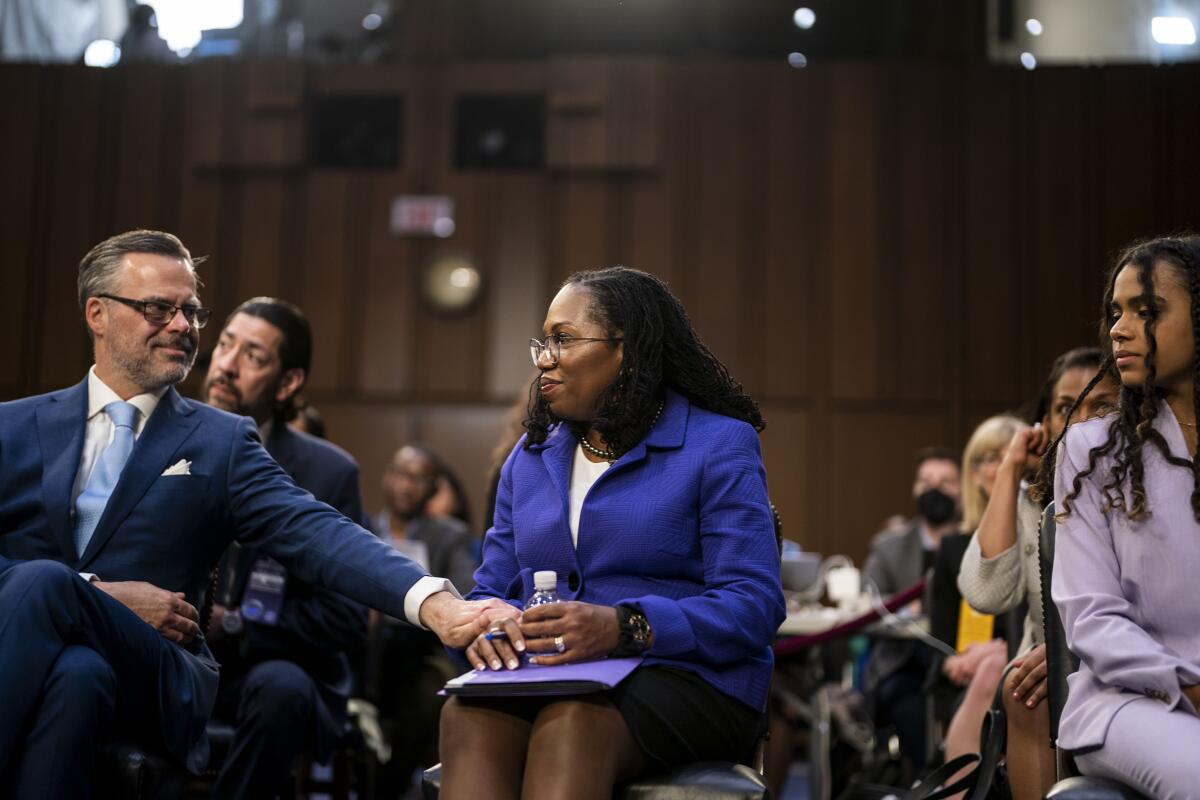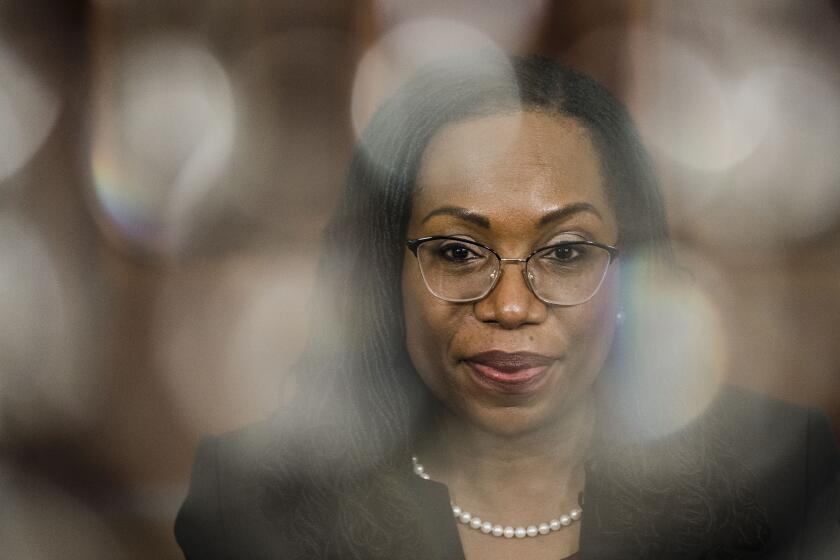Editorial: The Supreme Court needs Ketanji Brown Jackson’s experience

- Share via
Some Republican senators argue that Supreme Court nominee Ketanji Brown Jackson’s experience as a public defender shows that she is “soft on crime.” Those ridiculous assertions, certain to be repeated at her confirmation hearings this week, are tantamount to arguing that defending a person accused (rightly or wrongly) of a crime is essentially the same as advocating for the crime itself.
In defending their clients, public defenders defend the Constitution. Their job is to hold the zealous and often overbearing arm of the government in check, preventing prosecutors from cutting corners or railroading people accused of crimes. They give teeth to the promise of a fair trial and equal justice under the law, regardless of ability to pay.
That guarantee is as old as the Bill of Rights, but its acknowledgment is shockingly new. Before Los Angeles County created the nation’s first public defender’s office in 1913, a person accused of a crime and unable to afford a lawyer would most probably go into an American courtroom with no advocate, no assistance and no knowledge or ability to object to unconstitutional prosecutorial tactics. The only thing protecting the defendant from coerced confessions, biased jurors, lying witnesses, sketchy evidence, prejudicial arguments and an angry and fearful public would be the judge, who was very likely a former prosecutor.
Editorial: On Biden’s promise to appoint the first Black woman to the Supreme Court: It’s about time
There are many Black women who are highly qualified for the Supreme Court, which, with only two Black justices ever, fails to reflect all of America.
In especially serious cases, the judge might appoint defense counsel, who were often unenthusiastic members of the local bar. In the notorious Scottsboro Boys case in the 1930s, in which nine young Black men were accused of raping two white women, the judge appointed as defense attorneys a lawyer who hadn’t practiced criminal law in years and a real estate agent.
That inadequate representation made a mockery of the constitutional right to a fair trial before an impartial jury with effective assistance of counsel.
The U.S. Supreme Court finally recognized that when it ordered a new trial for the Scottsboro defendants in Powell vs. Alabama. But it took another three decades before its holding in Gideon vs. Wainwright that the 6th and 14th Amendments, if they are to have any meaning at all, require appointment of a competent and vigorous advocate for any criminal defendants facing jail or prison who can’t afford to hire their own counsel. Soon afterward, nearly every jurisdiction in the United States that hadn’t yet done so followed L.A. County’s example in creating a public defender’s office.
Public defenders are often provided, although not guaranteed, in criminal appeals, where they can pinpoint constitutional breaches and other failures of justice at the trial level.
That’s the noble profession Jackson chose in 2005, after serving in a series of prestigious positions, first as a clerk for a trial judge and an appellate judge, then at a top-flight Washington, D.C., law firm, later as the clerk to U.S. Supreme Court Justice Stephen G. Breyer, and afterward as assistant special counsel to the U.S. Sentencing Commission.
If confirmed, she’d be the first justice in the Supreme Court’s modern history to have served as a federal public defender.
She is being criticized for having defended detainees held at Guantanamo Bay, as if defending people accused of terrorist acts is the equivalent of defending the acts. That’s absurd. First-rate public defenders are essential precisely because their clients are unpopular. Constitutional guarantees of justice are meaningless if they apply only to people supported by the public.
Trial and appellate benches are loaded with former prosecutors but have very few defense lawyers and even fewer public defenders. Governors like to burnish their “tough on crime” images and are skittish about appointing defense lawyers. In California and other states in which judges can be elected, voters, too, have traditionally shown more enthusiasm for prosecutors.
Few defense lawyers on the trial bench means few elevated to appellate court judgeships, which in turn means that an entire perspective of vigorous constitutional defense and wariness about government overreach is missing at the highest levels of the judiciary. Jackson, upon her confirmation, will be the first former defense lawyer on the Supreme Court since Thurgood Marshall left in 1991, and the first former public defender — ever.
By all measures, Jackson is exceptionally qualified for the high court. She served her tenure as a public defender before the District of Columbia Circuit Court of Appeals. Later, she returned to the private sector before being appointed to the same U.S. Sentencing Commission that she formerly advised. She served eight years as a trial judge on the D.C. District Court, then as an appellate judge on the D.C. Circuit Court.
The current Supreme Court, perhaps surprisingly, has precious little trial court bench experience. That troubling lack of perspective is something Republicans should be eager to remedy by setting aside their specious and partisan “soft on crime” rhetoric and voting to confirm Jackson.
More to Read
A cure for the common opinion
Get thought-provoking perspectives with our weekly newsletter.
You may occasionally receive promotional content from the Los Angeles Times.











